|
Choosing A Primate
Do you want a monkey ?
What kind of monkey ?
Purchasing a primate

Do you want a monkey ?
Primates are one of the most
attractive animals in our animal kingdom. But, they are unpredictable, destructive,
expensive and they need a lot of care and attention. Since some of them can live for
over 40 years, they truly are a life-time commitment. Are you the person that is
willing to spend most of your free time with you monkey ? Before you consider buying
a monkey, you have to learn as much as possible about them. Read books, use the
internet, try to visit somebody who has primates at home, join primate
mailing lists (like monkeymail on yahoogroups.com) so you can talk to people who have primates. You have to figure out
which specie is perfect for you.
Before buying a primate you have to be sure that it is legally allowed to
keep primates where you live. Some places don't allow to keep certain or any
primates, others need a permit.
Like we said earlier, monkeys are very expensive animals.
Buying your monkey is just a beginning. You'll have to build a large cage even if you
buy a small monkey. Don't even think about buying a parrot cage. They are
really to small. You also need to provide cooling, heating and light. A
monkeys diet consists of commercial primate food, fresh food, fresh or cooked vegetables,
cereal, eggs, grasshoppers, meat, nuts, ... So, if you can't afford $3 a day for
their care you can't buy one.
Monkeys are very social animals. If you are not home all the time,
you will have to buy a companion for him. Realize when you buy a monkey that it will
be nearly impossible for you to travel since it is very hard to find somebody who can and
will take care of your monkey.
If you are going to let your monkey run around in your house you will have
to keep an eye on them all the time. Larger monkeys are able to open refrigerators,
doors even with a lock on it, turn over furniture, swing in curtains, open windows and
escape ....
All monkeys bite. I guess it is needles to say that a baboon will
bite a lot harder than a marmoset. Even with reduced teeth it will still hurt.
If you take your monkey out in public you have to realize that when it would bite
someone else that it could result in the loss of your monkey.
Make sure you find a vet specialized in primates before you buy your
monkey. The first thing you should do after you buy your monkey is going to a
primate vet for a check up. We hear to many times that people can't find a good vet
for their monkey when they really need one.
It's time for a reality check. Forget about those movies where you
see a monkey perform all kinds of tricks. Unless you are a professional animal
trainer you won't be able to teach your monkey a lot. If that is the reason
why you want a monkey or if it is just to show-off with them, then you will probably be the
first to get ride of them again.
So why would anybody ever want a monkey after knowing all this ?
Non-human primates are so close related to us that it scares and excites us at the
same. It is so incredible to see how they eat like we do, how they can climb,
how they like to play hide and seek, how curious they are... Some monkey owners say
their monkey is a family member, others talk about their children but they have all one
thing in common : they love their monkeys so much that they will do the
impossible for them!
What kind of monkey ?
Before you can buy a monkey, you will have to find out what monkey you
really want. Are you looking for an intelligent monkey like a capuchin or a smaller
monkey like a marmoset or a tamarin. Perhaps you are looking for something in
between like a squirrel monkey ? Maybe you would rather like to have a mouse-sized
monkey like a pygmy marmoset ? Hopefully the details and pictures below will make
you help the right decision.
Here is a list of primates commonly kept in captivity :
Capuchins
Guenons
Macaques
Marmosets
Squirrels
Spiders
Tamarins
Here is some global information for each specie :
Capuchins :
| Lifespan: |
35-45 years |
| Length: |
Head + Body : 12-22 inches (30-55 cm)
Tail : 12-22 inches (30-56 cm) |
| Weight: |
4-15 pounds (1.8-6.8kg).
Females are usually smaller than males |

Brown pale-fronted capuchin
(Cebus albifrons)
(c) Copyright - Ivan Crab |
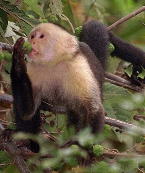
White faced capuchin
(Cebus capucinus)
(c) Philip Greenspun |

Black-capped capuchin
(Cebus appella)
. |
Guenons :
| Vervet : |
| Lifespan: |
20-25 years |
| Length: |
Head + Body : 17.9-25.7 inches (46-66cm)
Tail : 19.5-28.1 inches (50-72cm) |
| Weight: |
Females : 7-9 pounds (3.5-4.5kg)
Males : 9-10 pounds (4-5kg) |
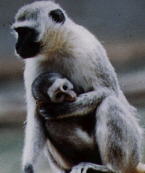
Green monkey
(C. aethiops) |
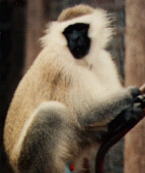
Grivet
(C. aethiops sabaeus) |

Vervet
(C. aethiops pygerythus) |
Macaques :
| Celebes Macaque : |
| Lifespan: |
25-30 years |
| Length: |
Head + Body : 22-31 inches (60-80 cm)
Tail : .39-.78 inches (10-20 mm) |
| Weight: |
13-35 pounds (6-16kg). |
|
|
| Java Macaque : |
| Lifespan: |
25-30 years |
| Length: |
Head + Body : 15-24 inches (38-65 cm)
Tail : 15.6-26 inches (40-65 cm) |
| Weight: |
8-22 pounds (4-10 kg) |
|
|
| Pig-tailed Macaque : |
| Lifespan: |
25-30 years |
| Length: |
Head + Body : 19.5-27 inches (50-68 cm)
Tail : 5-9.5 inches (14-24.5 cm) |
| Weight: |
10-35 pounds (4.5-16 kg) |
|
|
| Rhesus Macaque : |
| Lifespan: |
25-30 years |
| Length: |
Head + Body : 15-24 inches (38.5-65 cm)
Tail : 7-12 inches (38.5-65 cm) |
| Weight: |
10-30 pounds (4.5-14 kg) |
|
|
| Stump-tailed Macaque : |
| Lifespan: |
25-30 years |
| Length: |
Head + Body : 23-25 inches (60-64 cm)
Tail : .39-.78 inches (10-20 mm) |
| Weight: |
22-33 pounds (10-15 kg) |

Rhesus Macaque
(Macaca Mulatta) |
Marmosets :
| Common Marmoset : |

|
|
| Lifespan: |
7-20 years |
| Length: |
Head + Body : 7-12 inches (18-30 cm)
Tail : 7-16 inches (17-40 cm) |
| Weight: |
10-18 ounces (300-500 grams) |
|
|
| Geoffroy's Marmoset : |
| Lifespan: |
7-16 years |
| Length: |
Head + Body : 7-8 inches (18-20 cm)
Tail : 9-11 inches (23-29 cm) |
| Weight: |
10-12 ounces (300-360 grams) |
|
|
| Pygmy Marmoset : |
| Lifespan: |
over 16 years |
| Length: |
The pygmy marmoset is one of the smallest monkey on earth !!!
Head + Body : 4.7-5.8 inches (12-15 cm)
Tail : 6.6-9 inches (17-23 cm) |
| Weight: |
3.5-4.5 ounces (100-120g).
At birth the young weigh appr 0.5 ounces (15g). |
|
|
| Silvery Marmoset : |
| Lifespan: |
over 10 years |
| Length: |
Head + Body : 7-10.9 inches (18-28 cm)
Tail : 10.3-14.8 inches (26-38 cm) |
| Weight: |
10.6-12.7 ounces (300-360 grams) |
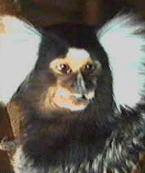
Common Marmoset
(Callithrix jacchus jacchus)
. |
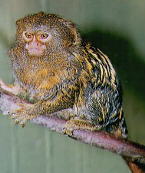
Pygmy Marmoset
(Cebuella pygmaea)
(c) Copyright - Ivan Crab |

Geoffroy's Marmoset
(Callithrix jacchus geoffroyi)
(c) Copyright - Ivan Crab |
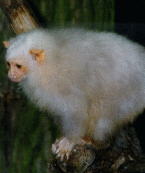
Silvery Marmoset
(Callithrix argentata argentata)
(c) Copyright - Ivan Crab |
Squirrels :
| Lifespan: |
15-25 years |
| Length: |
Head + Body : up to 12.5 inches (31 cm)
Tail : 16 inches (40 cm) |
| Weight: |
appr 33.3 ounces (950g) for males
appr 22.8 ounces (650g) for females |
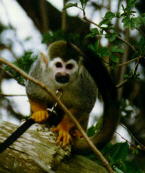
Common Squirrel monkey
(Saimiri sciureus)
Photo Credit - Brian Due Hansen |
Spiders :
| Lifespan: |
30-35 years |
| Length: |
Head + Body : 19-20 inches (48-52 cm)
Tail : 27-30 inches (70-78 cm) |
| Weight: |
13-25 pounds (6-12 kg) |

Brown-headed spider monkey
(Ateles fusciceps) |
Tamarins :
| Cotton-Top Tamarin : |
| Lifespan: |
15 years |
| Length: |
Head + Body : 7.8-11.3 inches (200-290mm)
Tail : 12.1-16.4 inches (310-420mm) |
| Weight: |
12.3 to 15.0 ounces (350- 450g) |
|
|
| Golden Lion Tamarin : |

|
|
| Lifespan: |
15 years |
| Length: |
Head + Body : 7.8 - 13.3 inches (200-340mm)
Tail : 12.3 - 15.6 inches (315-400mm) |
| Weight: |
12.7-25 ounces (360-710 g) |
|
|
| Emperor Tamarin : |
| Lifespan: |
18 years |
| Length: |
Head + Body : 9.2-10.4 inches (235-265mm)
Tail : 14-16.6 inches (347-423mm) |
| Weight: |
10.7-14 ounces (300-400 g) |
|
|
| Black Tamarin : |
| Lifespan: |
16 years |
| Length: |
Head + Body : 7.5-8.2 inches (190-210mm)
Tail : appr 10 inches (250mm) |
| Weight: |
9-13 ounces (250-365g) |

Cotton-Top tamarin
(Saguinus oedipus)
(c) Photo Credit - Renee |
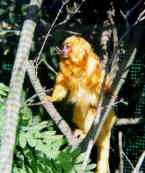
Golden lion tamarin
(Leontopithecus rosalia)
(c) Copyright - Ivan Crab |
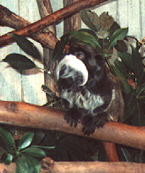
Emperor tamarin
(Saguinus Emperator)
. |
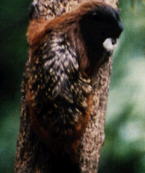
Moustached tamarin
(Saguinus Mistax) |
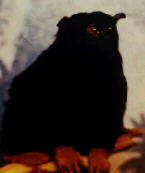
Red Handed tamarin
(Saguinus Midas) |

Saddle-back tamarin
(Saguinus fuscicollis Emperator) |
Purchasing a primate
Breeders will always be there, nobody will ever change
that! As far back as history goes, man always lived with pets - even exotics. Since there
are breeders and there is no way that anyone is going to stop them, why not concentrate
more on the actions of breeders and the people who purchase their animals? Do they truly
care about the primates they are breeding, do they place them in homes that are proper for
them, do they tell people the facts about the primates they are placing before they sell
it to them? Are they interested in the welfare of the animal or is it the money or making
a name for themselves that matters most? Do the people purchasing the animal know the
proper care of that species, can they afford the vet care and housing requirements, why
are they purchasing this type of animal?
Since people will always purchase primates, no matter how much anyone tries to talk them
out of it, why not concentrate on educating owners and potential owners? That is a goal I
set for myself, to aide primate owners and to educate potential owners about primate
ownership. I try to answer peoples' questions about all aspects of owning a primate and if
I can't answer the question, I direct them to someone who can answer either out of
experience or expertise. I am still a beginner with juvenile primates, but I am willing to
share what I have learned and experienced.
Here are some guidelines about deciding who to
purchase your primate from and things that you should do, before you purchase a primate:
1. I always try to buy directly from a
breeder instead of going through a broker, this way you can obtain more information about
your primate and learn more about it's history, you know exactly where it came from. Most
brokers don't give you alot of this information that might be useful should the animal
ever get sick.
Potential owners: Be aware that you might be told many falsehoods in order to get you to
purchase the primate, know who you are dealing with, ask alot of questions!
2. Is the breeder USDA licensed? This is a
must, it protects you and the primate and it is also the law.
3. If the breeder will ship the primate,
unescorted before the age of 8 weeks, find another breeder! I feel that shipping a primate
before that age is dangerous to their health and if the primate gets delayed somewhere,
nobody will feed it - ask the airline and they will confirm this. If you have to ship,
find the fastest way possible.
4. Does the breeder answer all your
questions truthfully such as the age of the primate, how to care for it and what might
happen if it is not cared for properly? Do they mention that it can get aggressive when it
matures and that it probably will not 'bond' with your human children? Do they mention
that primates in pairs normally do better than single pet primates? Do they mention the
responsibility, money and time it takes to nurture a primate?
If not, find another breeder!
Potential owners: Educate yourself before the fact, learn about diseases, care and diet of
the type of primate you would like to purchase - if possible, spend time at someone's
house that owns a primate and observe their care and needs. Again, ask questions.
5. Is the breeder pushing the sale or do
they say that maybe you should go home and think about it a while longer?
Potential owners: If the breeder is pushing the sale, you can assume that they are only
concerned about money and not the wellbeing of the primate or you. Take your time in
deciding, remember, this is possibly a 35-45 year commitment!
6. Is there any type of guarantees? If it
is a genetic guarantee you have found a good breeder, not too many offer them anymore. Do
they guarantee that the primate is healthy....do they honestly take it to the vet for a
health checkup before you take possession? If it is a guarantee that the primate you might
purchase will wait on you and entertain you the rest of your life and could possibly
become a movie star - laugh and walk away!
Potential owner: Genetic guarantees are a plus and health certificates should come with
the primate. Primates have a mind of their own, some are successful at learning tricks and
some are not. Do you have the patience and time to train the primate or do you have the
money to have a professional do it?
7. Does the breeder ask you questions? If
a breeder doesn't ask you about why you want a primate and how you plan to raise it, do
you think they honestly care about the welfare of the primate or you?
Potential owners: A responsible breeder cares!
8. Does the breeder mention cage
requirements and talk to you about psychological welbeing needs?
Potential owners: If you cannot meet these needs, you will not have a healthy, happy
monkey no matter what anyone tells you! Primates need space and toys and your time.
9. Try to deal with a breeder that you
have heard good things about from previous buyers. Be very careful, it's sad but there are
alot of scams going on out there! Be weary of breeders that want all the money upfront.
10. Always try to buy in person so you can
see exactly what it is that you are buying. If you can't do that, try to have the breeder
escort the animal to you, it will cost you more, but it is well worth it. If they will do
that, they care about the primate and where it is going and you can refuse delivery if
something is wrong (age, health, etc) You will be out the airfare, but you will not be
stuck with a primate that was misrepresented to you.
As for the potential owners, here are a few things
you should do:
1. Educate yourself about the type of
primate you want, before the fact.
2. Have all of your primate's needs available before it's arrival. (food,
cages, etc.)
3. Ask everyone questions...breeders, vets, experts and reputable
foundations.
4. Find a vet that treats primates before you purchase one - this is very
important!
5. Find people in your area that own primates and ask if you can visit a
couple of times.
6. Take your time about deciding to buy a primate, consider all the pros
and cons.
7. Check out all the information you get from anyone. Any false
information could lead to disaster for you and your primate!
8. Read everything you can get your hands on about primates!
9. Don't purchase a primate for a companion for a child or as a
substitute child.
10. And last but not least, continue to educate yourself after you get
your primate, the Internet is a great place to start!
I hope this helps potential owners in their search for a
primate. If you do decide to get one I wish you luck and many years of happiness together.
I can't stress enough how important it is to educate yourself before you get your primate
and for the sake of both of you, continue that education for the life of your primate.
|